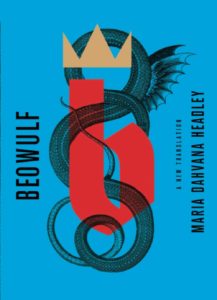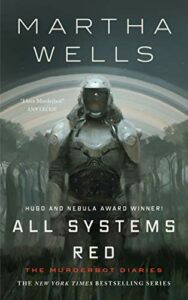I hope that Ursula Vernon wins a Hugo every year she is nominated (under her main name or in her T. Kingfisher guise) because she uses the time allotted for her speech wisely. The year I was able to attend Worldcon, she gave a disquisition about whalefall, i.e., what happens to a dead whale as it falls through the water to the ocean’s floor. This year, slime molds were on her mind. Worldcon needs more of these speeches, and it is up to voters to ensure that they happen.
In the two not-a-Hugos presented at the Hugo Award ceremony, I agreed with the voters on half of their choices and might well have agreed on both of them if I had infinite time available for reading. For the Astounding Award for Best New Writer, I voted for A.K. Larkwood, the only writer in the category whose work I read before the voting deadline. (If I read every finalist, that would amount to somewhere between a third and half of my annual reading. That’s quite apart from Best Series, which this year would have been 31 books if I had not read any of them previously. I’m pleased as punch to be a Hugo voter, but I’m going to read other things, too.) Larkwood’s The Unspoken Name is a fine book, especially for a debut, and I would have been happy if it had won. The award went to Emily Tesh, who was in her second and final year of eligibility; she was also a finalist in 2020. Among the other finalists, I’ve been intrigued several times by The Ruin of Kings by Jenn Lyons, so maybe I will pick it up in 2022. The Lodestar Award for Best Young Adult Book went to T. Kingfisher for A Wizard’s Guide to Defensive Baking. It’s a delightful book, and I wholly approve. Plus it got Worldcon another thank-you speech from Ursula Vernon, which is a thing that should happen as often as possible.
A Worldcon may choose to create a one-time Hugo Award category, and DisCon chose to give an award for Best Video Game. The one-time category is a way to test fannish support for potential new Hugo Award categories — Helsinki did this for Best Series in 2017, for example — to see whether it should become a permanent category. The only finalist anyone in my household had played was Animal Crossing, so it got my vote. It placed second to Hades.
For many of the following categories, I leaned heavily on the elements included in the Hugo voter packet. The packet is a great resource, and for some categories it makes a partially informed vote possible in the first place. (How can voters tell how much an editor contributes to a work? At least the voter packet lets me know what the editors worked on.) Best Fan Artist went to Sara Felix, who also got my top vote. For the voter packet, she highlighted paintings for fan magazines and jewelry that she made, and they were just really neat. Best Fan Writer went to Elsa Sjunneson; my top vote went to Paul Weimer. Best Fancast went to The Coode Street Podcast; I don’t listen to podcasts, so I didn’t vote in this category. Best Fanzine went to nerds of a feather, flock together; they were also my first choice. I think this is another category where a good presentation in the voter packet helped the eventual winners by highlighting their best work and concentrating voters’ attention. Best Semiprozine went to FIYAH Magazine of Black Speculative Fiction; my top vote went to Uncanny Magazine. Strange Horizons does good work, but this year they decided to list nearly 80 people as responsible for the magazine (including “staff members who prefer not to be named”) so I voted them below No Award for that stunt.
Best Professional Artist went to Rovina Cai; I had placed Galen Dara in the top slot. Best Professional Editor Long Form went to Diana Pho, who also received my first-place vote. Pho’s strong presentation in the voter packet — including testimonials and a clear statement about what she does as an editor — had an effect on my vote. And probably not just mine. Best Professional Editor Short Form went to Ellen Datlow. It is her ninth Hugo win in an editing category. My first-place vote went to Mur Lafferty and S.B. Divya, who came in second.
Best Dramatic Presentation, Short Form went to an episode of The Good Place. I voted for an episode of The Mandalorian. Best Dramatic Presentation, Long Form went to The Old Guard. I voted for Soul. For various reasons, I don’t see a lot of television series or movies these days, so I don’t have particularly strong views about these two categories.
Best Graphic Story or Comic went to Parable of the Sower: A Graphic Novel Adaptation. I’m stuck out at the end of a copper cable connection, and I balked at the 2GB zip file. Not very modern of me, I know. Anyway, I am glad to see the winner in this category was a stand-alone project. Not everyone wants to get involved in an ongoing series, so it’s good to see top recognition going to a work that is complete in a single volume. Doreen’s review is here. (Spoiler: She liked it a lot, and highlighted the “outstanding introduction.”) Best Related Work went to Beowulf: A New Translation by Maria Dahvana Headley, and I couldn’t be more pleased with the outcome of this category. The translation is great, a fresh look at Beowulf full of life and the joy of poetry. This is a terrific winner. Second place went to A Handful of Earth, A Handful of Sky: The World of Octavia E. Butler by Lynell George, which was also my second-place choice. My third-place vote went to The Last Bronycon: a fandom autopsy from Jenny Nicholson, which was a YouTube presentation. It was interesting, but not really my cup of tea. After those three, I voted No Award because I did not think that the other three finalists should win a Hugo for Best Related Work. In my view, conventions are not related works, so that ruled out FIYAHCON and the CoNZealand Fringe. The last nominee was a middling blog rant that was mainly notable for using the word “fuck” in the title and directing it toward a named person. I’m glad it didn’t win.
I’m not usually so aligned with Hugo voters, but for Best Series the voters ranked the four series that I had read some or all of in exactly the same order that I did. I’m not sure the trend would have continued if I had voted on the two series that I had not read at all, but I didn’t do that. We agreed that Martha Wells’ Murderbot was the best series among this year’s six finalists. Doreen and I have both written about several of the books in the series, so you can compare and contrast what we think.
“Metal Like Blood in the Dark” by T. Kingfisher won for Best Short Story. It was second on my ballot to “Little Free Library” by Naomi Kritzer. Doreen’s first choice was the winner, and her review of this year’s short story finalists is here. As a bonus, it was an opportunity for another Ursula Vernon acceptance speech, and Worldcon needs those.
The Best Novelette award went to “Two Truths and a Lie” by Sarah Pinsker, which Doreen called “wonderfully atmospheric” and “by far the scariest” of the six finalists. Both Doreen and I ranked “Helicopter Story” by Isabel Fall first, and I can’t help but think that Hugo voters missed this call. “Helicopter Story” offered a dangerous vision, and voters opted for a nominally scary story that was actually a much safer choice. Doreen’s round-up of the novelette category is here.
Nghi Vo won this year’s Hugo for Best Novella with The Empress of Salt and Fortune. My review is here. Doreen read it when it was new back in March, and her review highlights it as a Hugo contender. Well spotted! Both Doreen and I reviewed all of the novella finalists. In addition to The Empress of Salt and Fortune, and in alphabetical order of the author’s family name, there was Finna by Nino Cipri (me|Doreen), Ring Shout by P. Djèlí Clark (me|Doreen), Upright Women Wanted by Sarah Gailey (me|Doreen), Come Tumbling Down by Seanan McGuire (me|Doreen), and Riot Baby by Tochi Onyebuchi (me|Doreen).
The 2021 Hugo Award for Best Novel went to Network Effect by Martha Wells, the first novel-length Murderbot story. I liked it well enough, but as my review indicated, thought that Murderbot worked better at the novella length. Together with the Best Series win, this was definitely Wells‘ year for well-deserved praise and success. Other reviews of Best Novel finalists here at Frumious (again, in alphabetical order of the authors’ family names): Piranesi by Susanna Clarke (me, twice|Doreen and two of our author interviews in 2020 also mentioned Piranesi), The City We Became by N.K. Jemisin (me), The Relentless Moon by Mary Robinette Kowal (me), Harrow The Ninth by Tamsyn Muir (me|Doreen at Criminal Element), and Black Sun by Rebecca Roanhorse (me|Doreen).
Hugo voters agreed with me (or vice versa) in six categories. I’m most pleased with the winners chosen in the Lodestar Young Adult Award (not-a-Hugo, I know) and Best Related Work. Beowulf! I’m grateful for the Hugo voter packet that gives me the information to cast informed votes, and I think the packet does a great service for science fiction by making it easy to vote on work more than reputation. I think the access to more works and information has helped broaden the circle of winners in the decade-plus that publishers and creators have been supporting the packet. Authors I will probably (or have already) buy more from as a direct result of my exposure to their work during this year’s Hugo voting process include Nghi Vo, Aliette de Bodard (a reminder from previous years), S.A. Chakraborty, A.K. Larkwood, Emily Tesh, and Jenn Lyons. So much great work!





2 comments
I have so many Thoughts! But also I’m already saving my energy for next year’s slate, when I’ll hopefully be able to do a better job of keeping up with the reading.
Oh, did you see the longlist they published? Lots of interesting things to think about there, too.
Author
I would love to see some of those Thoughts!
Chicago in ’22? Maybe, maybe.
Speaking of maybe: maybe some of the new things you read this year will get nominated, so you’ll have a head start.
The list of the next ten places in nominations is very interesting, especially the novellas. And a Maureen McHugh story in novelette, woo-hoo!